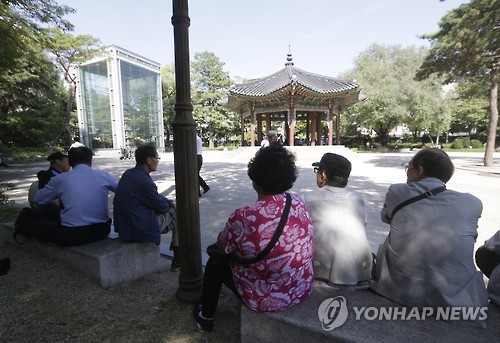- California Assembly OKs highest minimum wage in nation
- S. Korea unveils first graphic cigarette warnings
- US joins with South Korea, Japan in bid to deter North Korea
- LPGA golfer Chun In-gee finally back in action
- S. Korea won’t be top seed in final World Cup qualification round
- US men’s soccer misses 2nd straight Olympics
- US back on track in qualifying with 4-0 win over Guatemala
- High-intensity workout injuries spawn cottage industry
- CDC expands range of Zika mosquitoes into parts of Northeast
- Who knew? ‘The Walking Dead’ is helping families connect
S. Korea life expectancy rises to 82
SEJONG (Yonhap) — South Korean babies born in 2014 are expected to live more than 82 years as medical advances and efforts to maintain a healthy lifestyle reduce death risks, a government report showed Thursday.
According to the report by Statistics Korea, the life expectancy of babies born last year averages 82.4 years, up from the previous year’s 81.9 years.
Male and female babies are expected to live 79 years and 85.5 years, respectively. The figures are higher than the previous year’s tally of 78.5 years and 85.1 years.
This means a baby boy born last year has a 56.8 percent chance of reaching 80, while the chances of a baby girl becoming an octogenarian stood at 77.9 percent. Corresponding numbers for a boy reaching 65 stood at 86.5 percent and 94.3 percent for a girl.
The life expectancies for male and female babies here are 1.2 years and 2.4 years longer than the average for member countries of the Organization for Economic Cooperation and Development (OECD), the report showed.
Among members of the 34 developed market economies with high income, South Korea’s life expectancy for men ranked 17th, while those for women stood at fourth place.
The gap in life expectancy between men and women stood pat compared to the year before at 6.5 years.
South Korea’s gap is higher than the 5.2 year average for the OECD as a whole, and on par with countries like France and Japan.
“Although the life expectancy gap did not become smaller in 2014, there has been an ongoing trend of men catching up with women,” the statistical office said. It said one reason for this development is less men succumbing to liver-related diseases. In 1985, the gap stood at 8.4 years.
The chances that a person could die of cancer in the future stood at 28.4 percent for male babies and 16.9 percent for female babies. Both numbers are up vis-a-vis 2014 when they stood at 28.1 percent and 16.6 percent.
If the death risk from cancer is excluded, the life expectancies for male and female babies would increase by 4.8 years and 2.8 years, each, the report said.
The latest report also showed among babies born last year, a male baby could expect to enjoy 64.9 years of healthy living while the number for girls was slightly higher at 65.9 years.
Among regions, people living in Seoul and surrounding Gyeonggi Province have the highest life expectancy, while they were the lowest for the industrial city of Ulsan and mountainous Gangwon Province.
The difference, the office said, stems from the availability of medical services, income levels and other social considerations.
















